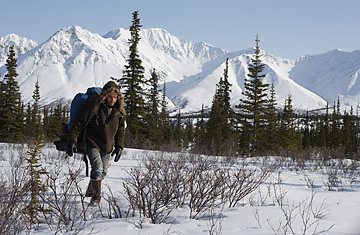
Into the Wild
The line between heroic martyrdom and psychopathic self-destructiveness is ever a thin and shifting one, and Sean Penn, the writer and director of Into the Wild, has obviously poured his generous heart and sympathetic soul into his adaptation of Jon Krakauer's best-selling account of young man named Chistopher McCandless, who chose (to his sorrow and our discomfort) to walk that line.
McCandless (Emile Hirsch) graduated from Emory University in 1992 and decided he needed a little time to himself before joining the bourgeois lockstep. It is a little difficult to see what's bugging him. His father (William Hurt) is a successful, self-made businessman, who is perhaps a little too sternly conventional in his views. His mother (Marcia Gay Harden) is a perhaps a little too softly so and, yes, there are strains in their marriage. But they are scarcely monsters, and the values they represent, though stodgy, are not exactly oppressive. Plenty of young people have slithered through the cracks in their faade.
But that's not for Christopher. He donates his not inconsiderable savings to charity, cuts up his credit cards and sets forth to find himself in the American vastness, aiming eventually to confront the Alaskan wilderness on his own. His is a sort of belated hippie odyssey and most of his adventures are fairly typical of that no-longer novel experience. He finds honest work and an agreeable boss in the midwestern wheat fields; he paddles prettily and adventurously down the Colorado River; he joins an older, good-natured couple in a commune; he eventually comes across an older man, a retired soldier (Hal Holbrook in a lovely performance), who becomes the fully understanding surrogate father he has always sought. Eventually he attains the wilderness of his dreams, settles into an abandoned bus, and lives out the winter in increasingly desperate circumstances. Whereupon he...
...Comes to a not very nice end. This kid's survival skills are about what you'd expect of a nice middle-class boy, who may have read his Thoreau, but who neglected to cultivate a Ralph Waldo Emerson he could count on for a warm bath and square meal when he really needed them. And despite the best efforts of Emile Hirsch, there's something annoying about him, too. He's too secure in his self-righteousness, too smug in his conviction that his is the only viable path to self-fulfillment. A lot of the dropouts he encounters on his way offer less radical alternatives to a life within the system. Theirs might not be your way, or mine, but they all seem reasonably content — a couple of jumps ahead of the IRS, a couple of yards away from Dilbert's imprisoning cubicle. They got the sun in the morning and the moon at night, as the old song would have it, and we can pretty much imagine them immune to the appeal of American Idol, Britney Spears or whatever else is cluttering the 24-hour news cycle.
One records this opinion with a certain amount of dismay. I happen to think Sean Penn is one of our more admirable knotheads — a fearless actor, a bold controversialist and, as he proved with The Pledge, a very strong director, capable of far subtler moral complexity than Into the Wild affords. I think the central mistake of this film derives from its lack of irony, a sense it refuses to impart that the world may not be exactly as the zealous Christopher perceives it to be. The film needs at least to entertain the possibility that its protagonist was driven less by high principle than by lamentable screwiness. And we need to leave it carrying some sense of tragic consequence with us. Instead, we're simply glad to be finished, at last, with this annoying man-child.
